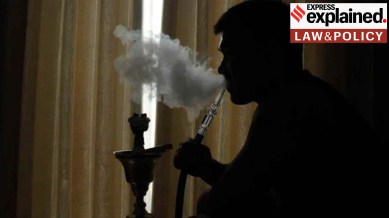Why High Court upheld Karnataka’s ban on hookah
On March 11, a single judge Bench of Justice M Nagaprasanna had reserved its judgment on the challenges by several restaurant owners to the government’s February 7 notification.

The Karnataka High Court on Monday (April 22) upheld the state government’s ban on hookahs as being in the interest of the general public, and ruled that hookah bars were an illegal “service” under India’s anti-tobacco law.
On March 11, a single judge Bench of Justice M Nagaprasanna had reserved its judgment on the challenges by several restaurant owners to the government’s February 7 notification.
Article 47 and Article 19(1)(g) of the Constitution
Article 47, along with the rest of the provisions in Part IV of the Constitution, is a “directive principle of state policy”. According to the Constitution, directive principles are not “enforceable by any court, but the principles therein laid down are nevertheless fundamental in the governance of the country and it shall be the duty of the State to apply these principles in making laws”.
The HC held that Article 47 was intrinsically linked with the right to life with dignity under Article 21.
“The paramount duty is cast upon the States and its authorities to achieve appropriate level of protection to human life and health which is a fundamental right guaranteed to the citizens under Article 21,” it said.
The petitioners argued that the government’s notification violates the fundamental right to “practise any profession, or to carry on any occupation, trade or business” guaranteed by Article 19(1)(g).
However, the court held that this freedom can be subject to certain reasonable restrictions including the prohibition of certain occupations, trades and businesses, if it is “in the general interest of the public”.
The court also held that a directive principle such as Article 47 can be used to justify a restriction on citizens’ rights under Article 19(1)(g).
Illegal ‘service’ under tobacco law COTPA
Under Section 31 of the Cigarettes and other Tobacco Products (Prohibition of Advertisement and Regulation of Trade and Commerce, Production, Supply and Distribution) Act, 2003 (COTPA), the Centre can make further Rules to carry out the provisions of the Act. In 2008, the Prohibition of Smoking in Public Places Rules were brought into force.
Justice Nagaprasanna relied on Rule 4(3) which, after an amendment in 2017, states “No service shall be allowed in any smoking area or space provided for smoking”. The court asked whether hookah smoking “is plain smoking which can be permitted in a designated area or it is a product of service that needs to be rendered”.
To answer this question, the court compared hookah smoking to smoking a cigarette. It found that while “smoking zones created in designated places do not give any other service except creation of a smoking zone”, hookah smoking “needs rendering of services in the designated area, as it requires external human hand to place all the apparatus on the tables like food or alcohol would be served on those tables”.
Thus, the court held, “the very act of preparation to smoke hookah tobacco, cannot but be held to be a service”, and the state is only implementing a prohibition against “service” that is already in place. The court held that the notification would also apply to “herbal hookah”, which too requires an “instrument”, and thus qualifies as a service under the Rules.